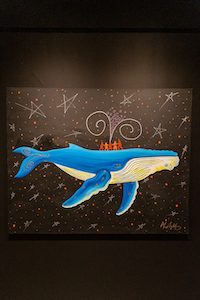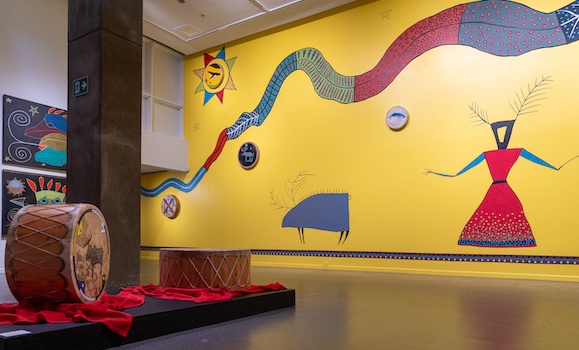As you enter the тАЩs current exhibition, the spirit of Alan SyliboyтАЩs work hits you immediately. Drums echo and vibrant images dance across walls in the form of portraits, painted instruments, and a larger-than-life mural of a great horned serpent. The emotional response is immediate.
Syliboy was born and raised on Millbrook First Nation, and his career as an artist is more than 50 years in the making. SyliboyтАЩs exhibit is a celebration of MiтАЩkmaq culture, spirituality, and friendship, drawing on a multitude of work from private collectors and friends. Many of the pieces focus on Indigenous petroglyphs, a form of rock carvings made by his ancestors.
The ║┌┴╧│╘╣╧═ЇArt Gallery commissioned Syliboy to paint a mural as part of the 50-year retrospective on his lifeтАЩs work. It took two weeks to bring the vision of the mural to life with the help of his grandchildren and others. Gallery Director and Curator Pamela Edmonds wanted the piece to guide the story of SyliboyтАЩs work with petroglyphs full circle.
тАЬI was seeing the wall as both large petroglyph and an expansive canvas,тАЭ explains Edmonds. ╠¤тАЬAs his ancestors were writing on rocks. I didnтАЩt want him to just have art objects in the gallery, but to be able to expand his vision for the space. The work started with the idea of creating an image of jipijka'm based on this mystical animal, a great horned serpent.тАЭ
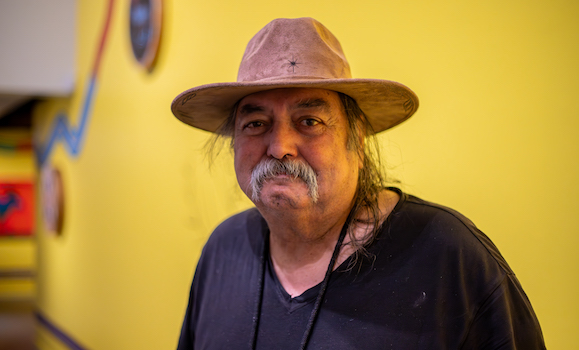
Artist Alan Syliboy.
The mural is the first thing you see as you enter the gallery. It extends far across the top of the wall and wraps around a small alcove filled with more of SyliboyтАЩs artwork. But as you dig into the exhibit, youтАЩll also find smaller visual connections back to his family and his artistic roots. One highlight is an early painting of two figures on a dark nature-inspired background of shadow and light. The painting was rendered in 1975 and brilliantly captures the early essence of SyliboyтАЩs work with petroglyphs. The figures speak to you in silence, evoking a sense of wonder and curiosity.
Throughout, youтАЩll hear music from his band, Alan Syliboy and The Thundermakers, where he plays percussion and also performs spoken word as well. One exhibit room is dedicated to music and vibrant sketches, showing some of AlanтАЩs drums and a hand-painted guitar belonging to his son.
тАЬHe was telling me this is an improvised song about how he works on his art, how he discovered the petroglyphs,тАЭ says Edmonds as she gestures to lyrics written on a wall called тАЬMarks on the Ground.тАЭ тАЬHe heard voices from his ancestors and understands culture as medicine, and remembering stories that were lost after contact with Europeans.тАЭ
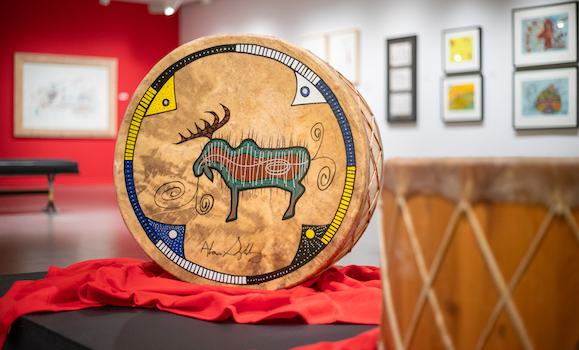
Drum painted by Syliboy.
The exhibit also includes animation, music videos and an homage to long-time friend and collector, Marcia Hennessy. Marcia was one of the main inspirations for the retrospective. She amassed more than 100 unique pieces of SyliboyтАЩs work in her lifetime.
тАЬThe show really started because of an idea that came from Alan about finding a way to honour her support of her work. Marcia was based in upstate New York, saw Alan's work at an exhibition in Toronto, and just fell in love with it,тАЭ says Edmonds. тАЬShe contacted Alan, and they maintained a friendship and corresponded for over 30 years,тАЭ Pamela explains.
Gallery visitors can read some of the correspondence she and Syliboy sent to each other during the course of their friendship and view an assortment of SyliboyтАЩs artwork from her private collection. The difference between these pieces and the larger paintings near the mural is striking.
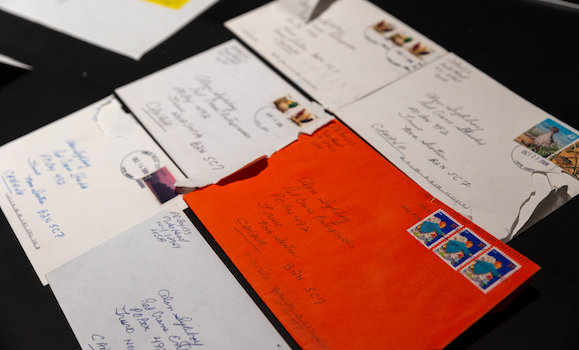
Letters and correspondence.
тАЬHe wanted to celebrate his collectors and supports as well,тАЭ Edmonds says. тАЬIt sort of shows the gratitude that Alan has for people that have supported him. It's not about just seeing art as an investment. It's also about supporting the culture. It's like a spiritual and creative community in this space.тАЭ
Syliboy is also the co-creator of the New Dawn Staff of Place and Belonging, used as part Dal convocation ceremonies. While the staff isnтАЩt present in the exhibit, itтАЩs worth pointing out the impact SyliboyтАЩs art has had within the ║┌┴╧│╘╣╧═Їcommunity, not only through this exhibit, but his contribution to graduates.
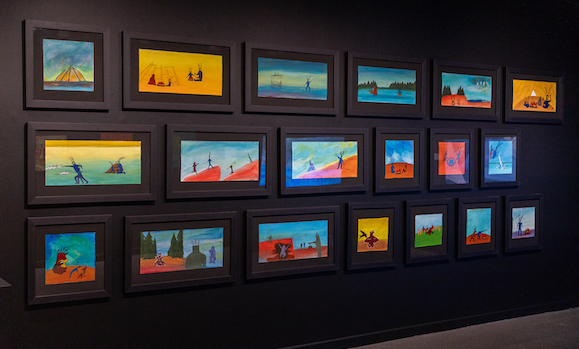
A series of painitings from the exhibit.
тАЬI think sometimes we get kind of stuck on this idea of what art should be or look like,тАЭ says Edmonds. тАЬI want the gallery to be a welcoming space to every community, that we show the diversity of not just the campus, but people that traditionally may have not been as visible in terms of cultural representation ItтАЩs important for the gallery to also to build on the collection of African Nova Scotian, MiтАЩkmaq, and other culturally underrepresented artists from our local communities. I think it's important for Dalhousie, because I feel that we're looking to be that kind of civic university that's local, but also has a global focus.тАЭ
Alan Syliboy: The Journey So Far is on display at the ║┌┴╧│╘╣╧═ЇArt Gallery until August 11, 2024. For hours and more information,
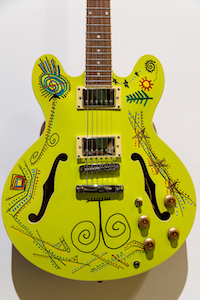 ╠¤
╠¤